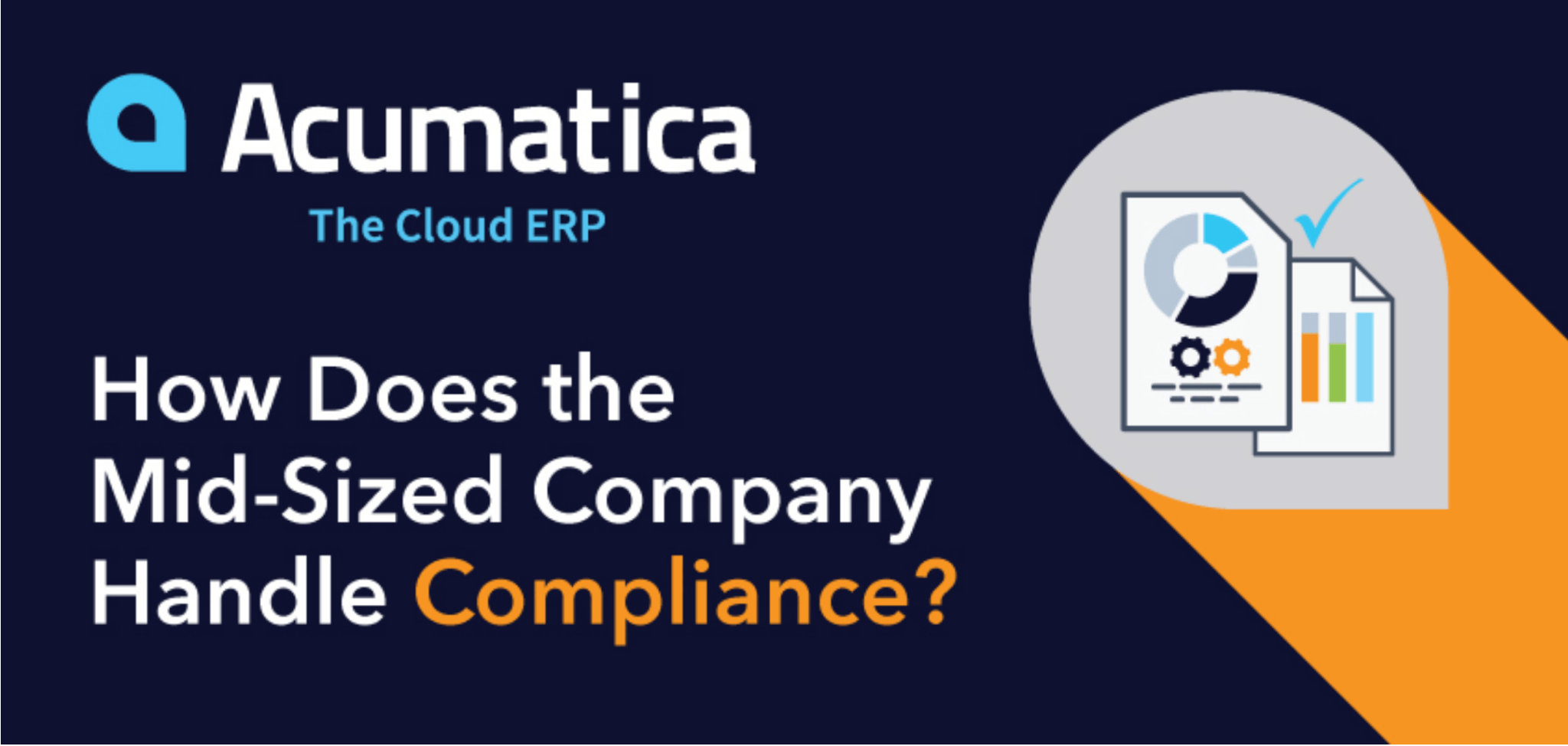By Bob Garofallou
As the fifth post in our Modern CFO series (the first four cover KPIs & reporting, planning for growth, communicating financial information, and achieving auditability), we discuss how, with the right ERP system, the compliance efforts of the Modern CFO can be significantly and positively impacted.
All companies must guard against the threats to their financial solvency due to violations of laws, regulations, and industry standards. Many business owners and executives have always viewed compliance obligations as a necessary evil, and it is usually left to CFOs to be responsible for an organization’s compliance program. Whether it’s dealing with local, state, and federal taxation reporting, financial statement audits, or Department of Labor requests, compliance tasks can eat up a significant portion of a Modern CFO schedule.
How mid-size companies can handle compliance requirements
For larger companies, bigger budgets mean an easier time lightening the compliance burdens of CFOs. Sizeable companies can hire dedicated staff, invest in additional software, or outsource compliance work to third-party providers. Providing a CFO with additional resources for compliance purposes, however, isn’t always possible for smaller and midsize companies. These companies often must optimize the employees and software they already have to keep up with the ever-changing compliance landscape.
The good news is that the right ERP system, one smaller and midsize companies can afford, allows the Modern CFO to manage compliance requirements effectively.
Effective internal controls
The first step to creating a first-class compliance department is proper training for all employees responsible for compliance, but this is only possible if your business has effective internal controls.
With well-functioning internal controls, a company can safeguard against fraud and theft and ensure a high level of accuracy with its financial reporting. A modern cloud ERP system can help design and structure job responsibilities for those involved with the compliance function as well as manage accounting policies and procedures, providing role-based security for all users of the system and a complete audit trail of all transactions.
The Modern CFO must ensure that the necessary infrastructure is in place to provide all stakeholders—including IT, HR, C-level, and others—the tools they need to meet compliance requirements and still perform their jobs effectively.
Many modern ERP systems now feature the capability to enforce internal controls to ensure compliance and mitigate risks associated with legal action, financial loss, or damage to the company’s reputation.
Keep current with statutes and industry standards
It takes time and financial resources to properly train your employees to become proficient with the statutes that affect your business. Changes in revenue recognition, lease accounting standards, and SECs pay-ratio rule are just a handful of rules and regulations that require vigilant monitoring by your compliance staff.
Complications arising from changing laws and professional standards can also affect other areas of your compliance department: A U.S. Supreme Court ruling in July 2018 paved the way for states to start collecting sales tax from online sales, while the Affordable Care Act continues to change every year, with additional financial reporting requirements for businesses and professional service providers.
Many modern ERP systems now feature automatic updates when existing laws are updated or changed, making it easier to keep up with changing rules and statutes.
Improve accuracy
Data entry errors can cost your company thousands of dollars in compliance costs. Incorrect audit information, errors and omissions on tax returns, or inaccurate employee information can mean potentially expensive fines and penalties.
ERP systems with modern financial management software can automate the collection and reporting of data needed to file compliance reports, helping your employees avoid unnecessary mistakes.
Improve efficiency
Tools in modern ERP software to create internal controls and automate compliance efforts can also be leveraged by companies to streamline their internal processes, leading to increased efficiency, improved operations, and reduced fraud and waste.
Compliance made easier with the right ERP system
CFOs of midsized companies will always have to juggle financial resources to properly staff and equip an accounting and compliance department. But with the right ERP partner and properly trained employees, the Modern CFO can oversee an efficient compliance department.
Contact our team at UdexxTech with any questions about Acumatica’s cloud ERP software or to request a demonstration, and you can check out our Acumatica Financial Management edition (highly rated by our customers) and our Reporting, Dashboards, and Data Analysis Toolkit for further information.






Leave A Comment
You must be logged in to post a comment.